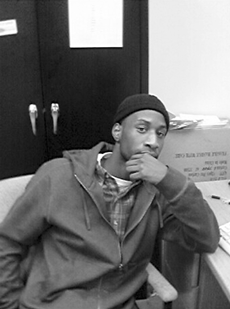Health experts debunk notion that the drug’s use is a white-only phenomenon
A town meeting exploring how the use of crystal meth affects gay and bisexual men of color drew roughly 75 people to the National Black Theater in Harlem on January 11.
“One of the things that we rarely get to hear about is crystal and African-American and Latino men who have sex with men,” said Soraya Elcock, deputy director for prevention services at Harlem United, an AIDS service organization and one of three sponsors of the event.
After welcoming the crowd, Elcock urged them to act, saying, “I don’t want to wake up ten years from now and see a crisis in my community.”
That crisis may have already arrived.
Following an overview on crystal from Damien Caruth, a community health specialist at Harlem United, Dr. L. Jeannine Bookhardt-Murray, the agency’s medical director, told the crowd that she has been working in Harlem since 1984 and had witnessed the wreckage caused by other drugs.
“I have seen this community devastated time and time again,” she said. “I have seen heroin, I have seen PCP, I have seen crack.”
Bookhardt-Murray is seeing men of color who are dealing with crystal.
“This drug has made its way across the country and uptown,” she said.
Bookhardt-Murray presented data on how meth works, its effects on the body and noted that meth users can have a difficult time quitting.
“It is a jones,” she said. “It is a real drive to get that thing that makes you feel better.”
Kelly Green, a research associate at the Center for HIV/AIDS Educational Studies and Training (CHEST) and one of five presenters at the town meeting, discussed data from a 1999 CHEST study.
Of the 49 men recruited for that study, 12, or 26 percent, were African American and five, or 10 percent, were Latino. While those numbers are provocative, the entire sample is too small to generalize though Green said that the perception that meth is a white gay man’s drug was not accurate.
“What we are seeing lately is that is really not true,” she said.
Green noted the “complex interplay” of meth, other drugs, and sex. Meth users tend to use crystal with other drugs, they associate sex with meth and they tend to have far more sex partners than men who use other drugs. That poses serious hurdles for treatment programs.
“You’re really saying to these men you need to drop everybody you know,” Green said. “I really think that treatment and prevention programs need to address the sex and meth link.”
Michael Kelly, the panel’s one meth user and a self-described “harm reductionist,” said that he used crystal while avoiding the damage noted by Bookhardt-Murray.
“Certain drugs can be used intelligently and without the bad effects the doctor described before,” he said. “If you use it, please use it intelligently.”
Kelly said he had used a number of drugs and that he does not experience the craving to get high on meth that he felt when he was using crack cocaine.
“I’ve used meth, I’ve used crack, I’ve used marijuana, etcetera, etcetera, etcetera,” he said. “That does not happen to me with crystal meth… I take holidays from my use.”
Andres Hoyos, a social worker at the Lesbian, Gay, Bisexual and Transgender Community Center, another sponsor of the town meeting, described the range of services available at the Center for meth users including harm reduction groups, recovery readiness groups, 12-step groups and referrals to programs that can help with meth detox and treatment.
The event’s third sponsor was the New York Panthers Leather Club and Caesar, the club’s treasurer, told Gay City News that the club was concerned about meth use.
“We do realize that it’s a problem,” he said. “We wanted to support the effort to get the word out.”
When the audience participation began, one attendee asked why there had been no discussion of the role that racism and heterosexism might play in meth use.
“What is your responsibility as a researcher to fight racism and heterosexism particularly when the people who fund you are perpetuating racism and heterosexism?” he said.
Bookhardt-Murray responded forcefully to the implication that funders were silencing her.
“As a physician in my room, my examining room, I can talk to you about whatever I want to talk to you about and it’s nobody’s business,” she said.
Donald Suggs, a longtime gay activist, called on the audience to respond to meth use.
“It’s up to us, as black gay men, to make decisions about how we want to socialize,” he said. “We have to save our selves.”
gaycitynews.com




































